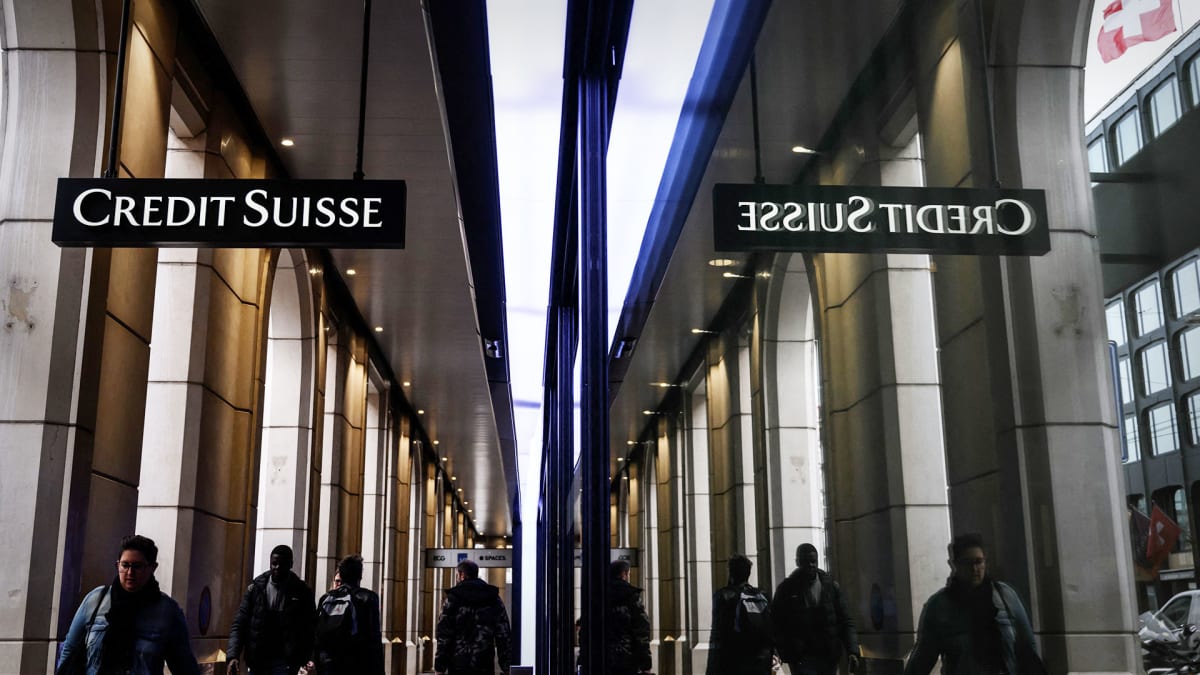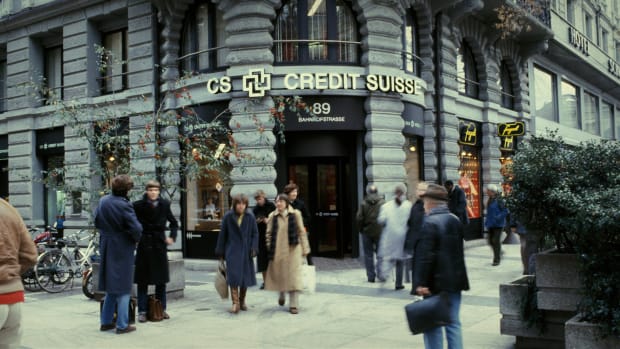
The corpses continue to come out of the drawers of Credit Suisse.
The No. 2 Swiss bank, which is trying to reinvent itself, continues to be hampered in its efforts by the skeletons of the past.
According to one of the most powerful Swiss regulators, the firm broke the law in the Greensill scandal, which further tarnished its reputation in 2021.
"In its proceedings, FINMA concluded that Credit Suisse Group seriously breached its supervisory duty to adequately identify, limit and monitor risks in the context of the business relationship with Lex Greensill over a period of years," the Swiss Financial Market Supervisory Authority FINMA said on Feb. 28.

Curtis ACKERMAN/Gamma-Rapho via Getty Images
'Serious Deficiencies'
It added that it "found serious deficiencies in the bank’s organisational structures during the period under investigation."
In addition, the regulator said Credit Suisse "did not sufficiently fulfill its supervisory duties as an asset manager. FINMA thus concludes that there has been a serious breach of Swiss supervisory law."
Greensill Capital, a specialized lender with links to former U.K. Prime Minister David Cameron, was founded in 2011 by the financier Lex Greensill. The British company was a supply chain and accounts receivables lender, that specializes in lending money to companies so that they can pay their suppliers. It then packaging the debts of these companies into financial securities, which it resold to investors.
The house of cards began to crumble when these investors, including Credit Suisse, had doubts about the real value of the debts and abandoned Greensill, which then filed for bankruptcy in March 2021.
Credit Suisse invested $10 billion of its clients' capital in Greensill products.
The bank had to shut down, at a short notice, four supply chain finance funds connected with Greensill Capital and then was forced to reimburse its clients by distributing at least $4.8 billion to them. Credit Suisse had managed to collect this money from receivables redeemed when the four supply chain finance funds (SCFFs) were suspended on March 1, 2021.
FINMA pointed out that Credit Suisse has already taken steps to remedy the shortcomings that led to the Greensill scandal.
"Governance structures were revised and control processes strengthened, namely in the approval and monitoring of fund products," the regulator said, but added that if they support these measures, FINMA "is ordering a number of other measures to further improve the banking group’s risk management and governance."
Credit Suisse must periodically review the business relationships of its highest managers to prevent misconduct.
"If they [managers] do not organise and manage their business area in such a way that misconduct is prevented as far as possible, they must be sanctioned by the bank, for example through a reduction of their variable compensation," the regulator recommended.
FINMA will appoint an audit mandatary to review compliance with these supervisory measures.
Former Credit Suisse Managers Under Investigation
Credit Suisse CEO Ulrich Körner expressed his relief to see this investigation closed.
"This marks an important step towards the final resolution of the SCFF issue," Körner said in a statement. "FINMA’s review has reinforced many of the findings of the Board-initiated independent review and underlines the importance of the actions we have taken in recent years to strengthen our risk and compliance culture."
"We also continue to focus on maximizing recovery for fund investors,” he said.
The bank made it clear that "FINMA has not ordered any confiscation of profits in connection with the proceedings and the implementation of the additional measures is not expected to result in significant costs for Credit Suisse."
The regulator, however, indicated that it "opened four enforcement proceedings against former Credit Suisse managers."
It didn't disclose their names.
Besides Greensill, Credit Suisse was exposed in 2021 to the Archegos Capital Management scandal. Bill Hwang is a South Korean investor based in New York whose Tiger Asia, a company he funded in the 2000s, suffered a major setback in 2012 because of insider trading allegations. Hwang gradually revived Tiger Asia which became Archegos.
While his company would manage $10 billion, Hwang convinced banks, including Credit Suisse, to lend him $30 billion to invest more. In 2020, he invested heavily in ViacomCBS (VIACA) which saw the value of its shares soar.
At the beginning of 2021, Credit Suisse asked Archegos to deposit funds. Hwang promised to reduce the risks. But in March 2021, ViacomCBS shares crashed and the banks asked Archegos to cover the losses, which it was no longer able to do. As a result Hwang's company went bankrupt.
"The investigation found a failure to effectively manage risk in the Investment Bank’s Prime Services business by both the first and second lines of defense as well as a lack of risk escalation," an independent investigation ordered by Credit Suisse concluded.







